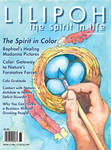Contact with Wild Places: The Antidote to Nature Deficit Disorder
 By Ricardo Sierra
By Ricardo Sierra
Issue: Spring 2008: The Spirit in Color - Issue #51, Vol. 13
“It is hard to argue with a thunderstorm, or blame poison ivy on the plant.”
As a boy growing up in upstate New York, I attended the pioneering class of the Hawthorne Valley Waldorf School. It was a very rural area, (some of my classes were taught in an ancient goat barn), and most of my free time was spent outside. My childhood, like many readers who are over thirty, consisted of imaginative play, reading, cooperative games with neighborhood kids, and family time. We built forts, wandered in the woods and fields around local farms, discovered which ponds held fish, what to wear when it rained, how to recognize poison ivy and which local dogs to avoid. The places I explored, alone or with friends, helped shape who I am today. Seeing that I work in various areas of earth skills education, and wilderness leadership, I haven’t fallen far from the tree.
However, I never imagined that my days outside planted powerful seeds of protection, life skills or inner development. In fact, that was never in my mind at all. It wasn’t in anyone’s mind. It was a matter of what options were available.
My journey towards mentoring youth started with my passion to know how the native peoples in America survived for thousands of years without Walmart, Home Depot or Red Lobster. Everything they needed was handmade, directly from nature, which, when considering clothing, shelters, tools and medicines, was impressive. I studied ancient skills voraciously, practicing fire-making using fire by friction, tracking animals according to Apache methods of observation, learned wild edible plants and stone tools. My confidence grew with each new skill gained.
Taking kids on my gathering forays, wilderness trips, or tracking adventures, I was amazed at the changes that took place in them. Making a fire for the first time, learning to handle a knife, or build a shelter that will shed rain effectively changed these young people in powerful ways. It wasn’t just the challenges, either. The solitude, the connection to plants, trees, rocks and birds all seemed to combine with the self-reliance skills to form a foundation upon which self-esteem, confidence, empathy, leadership and inner strength were established. I was fascinated by what I observed in these students, seeing them pull many of their reasoning, creativity and communication skills all together on a trek, with powerful results.
Richard Louv, author of Last Child in the Woods: Saving our Children from Nature Deficit Disorder, has almost single-handedly initiated a wave of concern leading to action on the issues of obesity, depression, attention deficits and loss of creativity, all symptoms of our disconnect from nature. His interviews with children who prefer to stay inside and play with electronic media rather than risk getting dirty outside indicates a cultural shift where nature is intellectual and marginalized. It has happened over several generations, with each loss of our connection balanced by a new ailment, problem or crisis.
Now, at forty-three, I have run youth programs, adventures, expeditions and camps for eighteen years. All were designed using a combination of skills gleaned from the Sami people of the Arctic Circle, or from Aboriginal Australia, or the desert Southwest Navajo, to name a few. These skills work because all of us are descended from people who at one time or another lived close to the earth. Nature provides a powerful place to learn, as she doesn’t take sides, and her rules are based on natural law. It is hard to argue with a thunderstorm, or blame poison ivy on the plant. Awareness, common sense and hard work are coins that have real value here in the woods.
What I didn’t know at the time I was growing up, was that ‘nature time’ was not leisure time. It was more important than any of us realized, and it isn’t too late to receive these life-changing effects. We just have to get ourselves, and our kids, outside.
Ricardo Sierra is the director of Hawk Circle Wilderness Education, providing powerful experiences for children, teens, adults and families in a variety of native skills classes, earth education and wilderness leadership. He lives with his family in Cherry Valley, NY. He can be reached for comment at Ricardo.J.Sierra@gmail.com, or at 607/264-3396.
